- March 23, 2023
- Blog, Products
- Posted by Felix.Weber
- Comments Off on Application/Spray Drone open House
 Come and learn how you can start using Application/Spray drones on your operation.
Come and learn how you can start using Application/Spray drones on your operation.
A great day to ask questions and learn more about regulations, and how you can use an application drone today.
Please call us for information and to RSVP
519-343-5454 ext. 101
226-243-6488
or send us an email to training@AgBusiness.ca
- December 28, 2022
- Blog, Maintenance
- Posted by Brian Hall
- Comments Off on Winter is Here – Operating Your Wintex in Cold Weather
Cold weather brings its challenges to operating equipment. It is important to begin considering the effects of cold temperatures on the fluid system. Follow these extra tips for operating your Wintex during the winter months
- Do a daily walk around and also clear the equipment of any snow/ice buildup on components like the probe, probe scrapper, and platform. Check for any maintenance issues like a cracked hose, hydraulic leaks, or the condition of chains and the O ring.
- Viscosity & Fluid checks: Viscosity should be the first consideration when preparing fluid power systems for the Check the oil in both the engine and hydraulics so that it drips from the dipstick. If any fluid is too thick to drip off the end of a dipstick, it is too viscous to function properly, especially in the cold. Even though the freezing point that causes high-viscosity hydraulic oil to gel and becomes unusable is -10 degrees [...]
- December 28, 2022
- Blog, Products
- Posted by Felix.Weber
- Comments Off on DJI Agriculture Service Centre
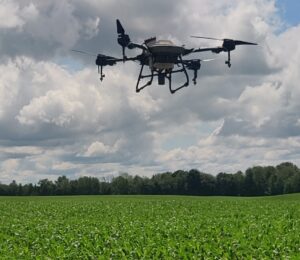 Ag Business & Crop is pleased to become a certified service centre for DJI Ag-Drones. We are pleased to be able to bring application drones to Canada, as a DJI dealer. Felix Weber (CEO) is a member of a working Group on regulations, and technical working information. Stayed tuned
Ag Business & Crop is pleased to become a certified service centre for DJI Ag-Drones. We are pleased to be able to bring application drones to Canada, as a DJI dealer. Felix Weber (CEO) is a member of a working Group on regulations, and technical working information. Stayed tuned
- December 28, 2022
- Blog, Maintenance
- Posted by Felix.Weber
- Comments Off on Winterize your Wintex
If you are done soil sampling until next spring, it is a good habit to fully service your Wintex and Honda motor, while sampling season is still fresh in your mind.
Keep it Clean: The first step should be to thoroughly clean the Wintex and take care of routine maintenance items. If using a pressure washer, just be careful around any electrical components.
Fully service the Honda Engine. The Honda owner’s manual has a detailed section on maintenance and off-season storage. What we like to do is change the oil, change the fuel filter, fill the gas tank, and use a fuel stabilizer. An oil change is especially important when it comes to winterizing small engines, as old oil can contain small contaminates that can be corrosive to the system if left sitting for a long period.
Service Your Wintex: Refer to our service videos and bulletins for more information on Wintex Service Videos.
We [...]
- December 28, 2022
- Blog, Maintenance
- Posted by Felix.Weber
- Comments Off on Service Update: Wintex 1000s, 2000, & 3000 Models
On occasion a client has called about a sticking probe, or a probe stuck in the ground. There are several possible causes of this including soil conditions. Below are steps to manually raise the probe up, along with some potential causes.
For any sensor issue, clean off sensor first. There might be some metal suck to the sensor (magnetic) giving false readings.
Stuck probe:
- Mounting height: The proper footplate height is 8 to 9 inches off the ground when the footplate is fully retracted. When the footplate does not rest on the soil, the Wintex can shift the changing angle of the probe when going down or up, which can cause the probe to become stuck, or causing excessive wear. It is important your vehicle not shift while sampling, which can cause the probe to become stuck
On trucks using our truck box frame: Adjust the mounting height of the Wintex on the [...]
- December 28, 2022
- Blog
- Posted by Felix.Weber
- Comments Off on Wintex 2000 Demo Model – Year-End Sale
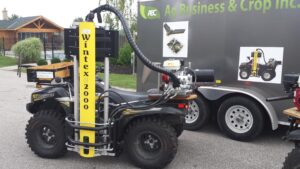
We have a demo Wintex 2000 sampler, refurbished, that would be excellent for a farmer wanting to do their own sampling, or for someone wanting a second, or backup sampler. All our used Wintex units are serviced and come with a warranty. Contact Felix to learn more felix@agbusiness.ca
- November 8, 2022
- Blog, Maintenance
- Posted by Felix.Weber
- Comments Off on Manually Using the Hydraulics to Pull the Probe Up
Manually Using the Hydraulics to Pull the Probe Up
The hydraulics can be operated manually using the controls on the hydraulic block.
- Activate the probe rotation by pressing down the red rotation valve button to release the lock pin (will come up a bit). Turn the button counter-clockwise to activate probe rotation.
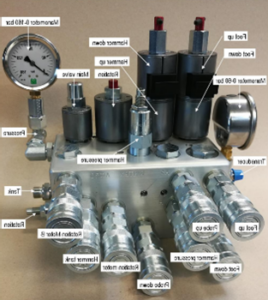
- Locate the hammer/probe valve. The probe goes down when pulling the valve. The probe goes up when pushing the valve. At the same time always activate the main valve by pressing it down when activating the other functions.
- Never lift the foot off the soil surface while the probe is in the ground. This can change the angle of the probe.
Remember to re-set the rotation valve before continuing to sample of the probe.
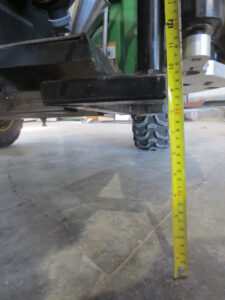
- August 9, 2021
- Blog, Production
- Posted by Brian Hall
- Comments Off on Top Soil Sample Depth Needs to be Consistent
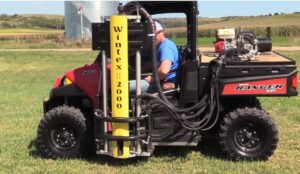 Quality soil sampling is critical to correct interpretation of results. We stress to clients this point and write often about collecting and interpreting results. This has become even more critical as agronomists and growers adopt more precision 4R nutrient management. A few years back AgVise lab completed a demonstration project on the effect of sampling depth for several nutrients. The project had 7 sampling points and 4 depth comparisons at each point. Soil Samples were collected with a Wintex 1000. Twelve cores per point were collected perpendicular to the planted rows of soybeans. The field was a well-drained sandy loam – loam texture, conventional tillage. The data indicated that phosphorus, potassium and zinc levels decreased with depth. Phosphorus & zinc move very little in soil so results were [...]
Quality soil sampling is critical to correct interpretation of results. We stress to clients this point and write often about collecting and interpreting results. This has become even more critical as agronomists and growers adopt more precision 4R nutrient management. A few years back AgVise lab completed a demonstration project on the effect of sampling depth for several nutrients. The project had 7 sampling points and 4 depth comparisons at each point. Soil Samples were collected with a Wintex 1000. Twelve cores per point were collected perpendicular to the planted rows of soybeans. The field was a well-drained sandy loam – loam texture, conventional tillage. The data indicated that phosphorus, potassium and zinc levels decreased with depth. Phosphorus & zinc move very little in soil so results were [...]
- August 8, 2021
- Blog
- Posted by Brian Hall
- Comments Off on WintexAgro Canada Western Demo Tour and AgSmart

We are very much looking forward to our Western Canada trip, Aug 2-14th to speak and attend AgSmart, Aug 10 & 11, in Calgary. Along the way we will be visiting Agri-businesses for demonstrations of our Wintex soil samplers and eBee Ag drone. Most of our trip will be along the TransCanada highway, however we would sure be happy to arrange a visit and demo if at all possible.
Contact Felix directly by
email: Wintex@AgBusiness.ca
https://wintexagrocanada.com/
- May 12, 2021
- Blog
- Posted by Felix.Weber
- Comments Off on Used Wintex 1000 Unbeatable Value
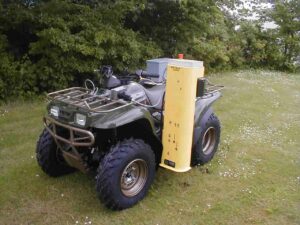 Automate your soil sampling today at a great price on a used Wintex 1000 soil samplers. For someone starting out that does not want to spend a lot, we have a refurbished unit that just arrived. Contact us today via
Automate your soil sampling today at a great price on a used Wintex 1000 soil samplers. For someone starting out that does not want to spend a lot, we have a refurbished unit that just arrived. Contact us today via
email sales@agbusiness.ca or phone 1-519-343-5454 ext. 114
